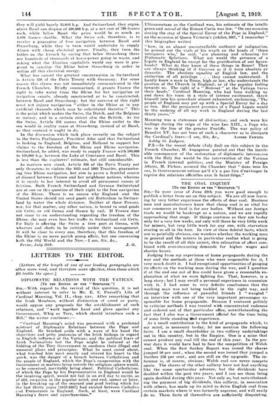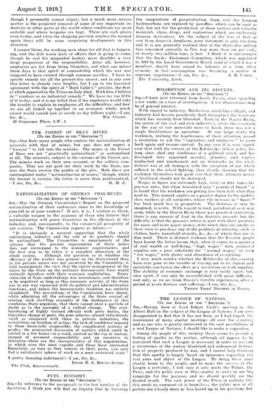THE COAL INQUIRY
ITO THE EDITOR Of THE " SPECTATOR."]
SIR,—In your issue of June 28th you were good enough to publish a letter from me on this subject. We are all now learn. ing by very bitter experience the effects of dear coal. Business men and manufacturers know that cheap coal is as vital for our commerce as food is for our bodies. Without our foreign trade we would be bankrupt as a nation, and we are rapidly approaching that stage. If things continue as they are to-day only for a very few weeks, not only will there be very little work for miners, but very little work for any one, with starvation staring us all in the face. In view of these doleful facts, which are so painfully obvious, one wonders whether the working man in general and the miners in particular realize what is going to be the result of all this unrest, this relaxation of effort com- bined with ever-increasing demands for higher wages and shorter hours.
Judging from my experience of home propaganda during the war and the methods of those who were responsible for it, I very much doubt it. I had exceptional opportunities of gauging its effects on the working man during the war, and I question if at the end one out of five could have given a reasonable 'ex- planation of what we were fighting for. That, however, is a long story; but I may recall a personal experience in connexion with it. I had come to very definite conclusions that the working man was not being tackled in the right- way, and through the influence of powerful friends I ."wangled an interview with one of the very important personages re- sponsible for home propaganda. Because I ventured politely to criticize methods I was treated with concentrated rudeness and ordered out of that particular office, notwithstanding the fact that I also was a Government official for the time being of some little standing Ord experience.
As a small contribution to the kind of propaganda which, to my mind, is necessary to-day, let me mention the following facts. I am a small shareholder in two colliery undertakings not in this country, but in the Empire. One is a mine that cannot produce any coal till the end of this year. In the pre- war days it would have had to face the competition of Welsh coal. When the first Sankey Report was issued the shares jumped 50 per cent., when the second was issued they jumped a further 250 per cent., and are still on the up-grade. The in- ference is, of course, obvious; Welsh coal can never compete again. The shares of the other colliery have not had anything_ like the same spectacular advance, but the dividends have doubled within the past two years, and I can see them being again doubled during this year. Not only so, but notwithstand- ing the payment of big dividends, this colliery, in association with others, has made up its mind to drive English coal from certain markets where it was formerly supreme, and will easily do so. These facts of themselves are sufficiently disquieting,
though I personally cannot object; but a much more serious matter is the projected removal of some of our important in- dustries to other parts of the world where conditions are more suitable and where bargains are kept. There are such places even to-day, and when the shipping position reaches the normal again titers will be some surprising developments in this direction.
I cannot blame the working man alone for all that is happen- ing, and the-still worse state of affairs that is going to come, though he and his misguided leaders must shoulder a very large proportion of . the responsibility. After all, however, employers are far from being blameless, and what one misses these days is that spirit of comradeship which the war was supposed to have created through common sacrifice. I have no specific remedy for all the present-day unrest, and in any case this letter is already very lengthy, but I am in the heartiest agreement with the spirit of "Boyd Cable's" articles, the first of which appeared in the Times on July 22nd. With him I believe in " candour as an industrial remedy." We have far too little of it to-day, and it is my belief that if the employers would take the trouble to explain to employees all the difficulties, and how we are all linked up together in an economic whole, much unrest would vanish just as surely as day follows night.—I am,
39 Grosvenor Place, S.W. 1.



































 Previous page
Previous page